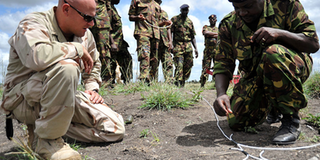Wikileaks: Museveni discredits Kenya army

Explosive Ordnance Disposal Technician, Ryan Donofrio, left, and Kenya’s Lance Cpl. Tajeu Olomunyak, practice proper explosive disposal techniques at the Kenyan Ministry of Defense Stony-Athi Range. President Museveni, according to a leaked cable doubted the ability of the Kenya Army to fight Somali insurgents. Photo by U.S. Air ForcE Staff Sgt. R.J. Biermann
What you need to know:
Revealed. Although the US declines to comment on these disclosures, they have caught everyone by surprise.
KAMPALA
President Museveni allegedly questioned the capability of the Kenyan army to fight the Somali insurgents in Somalia; US ambassador to the African Union Michael Battle has said in a US leaked diplomatic cable.
Museveni questioned Kenya’s army bush-fighting credentials and the ideological commitment of its Somali proxies. He advised the West to pay and develop Transitional Federal Government (TFG) fighters rather than the much more expensive and less effective options of funding international peacekeepers and counter-piracy operations.
Mr Battle’s comments, contained in a 2010 diplomatic briefing to Washington, leaked to whistleblower website, Wikileaks, were first published on Sept. 1, 2011.
According to the cable, Mr Museveni described the Kenyan forces as a “career army” and wondered about their ability to sustain bush fighters. “Is Kenya used to fighting like this (bush and guerrilla warfare)? Would Kenya be able to provide logistical support to its Somali allies?” Mr Museveni wondered. “Fighting is foremost ideological, especially in a stateless conflict. The Armed Forces of the Democratic Republic of the Congo face a similar challenge, said Museveni,” he was quoted.
The cable said the President was responding to (US assistant Secretary of State for African Affairs Mr Johnnie) Carson’s question about Kenya’s proposed Jubaland Initiative. Mr Museveni acknowledged the operational value of seizing Kismayo and, more broadly, denying al-Shabaab access to sea and airports.
Liberation or influence?
The cable says Mr Museveni questioned the capacity of the Kenyans to manage such an offensive, as well as the ideological commitment of the Somali proxy forces.
Mr Museveni reportedly told top US diplomats in a free-ranging conversation on the margins of the African Union (AU) Summit in Addis Ababa in January 2010 that the Kenyan army and its allies in Somali semi-autonomous state of Jubaland were not ideologically prepared to fight al-Shabaab.
This is the first time that Mr Museveni’s view is made public on the capacity of a regional army. In his view, he even questioned whether the proposal was not just an extension of the Kenyan army into Somalia. “Would Somali fighters participating in the Jubaland Initiative be a liberation movement or an extension of the Kenyan Army?” he asked.
Efforts to get comments from the Kenyan government were futile as the High Commissioner to Uganda said he was in hospital in Kenya. While Kenyan government spokesperson Alfred Mutua did not take our repeated calls.
Mr Carson told Museveni: “The Ethiopian government originally had concerns that a Kenyan-sponsored Somali force might eventually shift its support to the Oromo National Liberation Front (ONLF), but that (Ethiopian) Prime Minister Mr Meles (Zenawi), now seemed comfortable there are control measures to preclude such a force from meddling in the Ogaden.”
Kenya government has been supporting the semi-autonomous state of Jubaland to stop threats by al-Shabaab from advancing further south of Somalia. Kenyan is credited for its efforts during the Nairobi peace talks that led to the formation of the Transitional Federal Government seven years ago.




